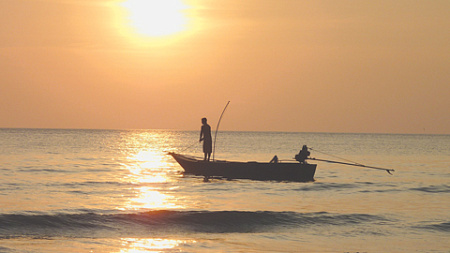
In the waning years of the Cold War, a Soviet fishing trawler with the celestial name ‘Halley’s Comet’ sailed the waters of the Arabian Sea. The official mission, a product of the late USSR’s friendship with the People’s Democratic Republic of Yemen, was to study the marine resources off the coast of South Yemen and the island of Socotra. Yet, looking back across nearly four decades, the most profound discoveries of that expedition were not scientific, but deeply human, revealing the complex, often contradictory, nature of people isolated together at sea.
Onboard, cultural frontiers were crossed not just geographically, but in daily conversation. A memorable exchange with a Yemeni ichthyologist, Ali Salem, a graduate of a Soviet university, laid bare the chasm between our worldviews. While I, a young scientist proud of my rudimentary karate training, believed a fit physique was a man’s greatest asset, Ali argued the opposite. He insisted that a burgeoning belly was the true mark of success—a clear signal to potential partners of intellectual status and freedom from the manual labor of the lower classes. It was a stark lesson in how status and security are perceived differently across cultures.
Life within the Soviet crew of fewer than twenty was its own microcosm of drama and tension. Rumors constantly swirled around the ship’s cook, Lena, a single woman who consistently rebuffed the advances of her shipmates. The gossip was a thinly veiled attempt to explain away her independence. This simmering tension came to a head in a small but devastating tragedy: the sudden disappearance of Lena’s beloved cat, Vasily. The entire crew mourned the loss of the ship’s mascot, who was presumed to have been thrown overboard.
The unspoken consensus was that the cat had been sacrificed as a cruel act of revenge for its owner’s unyielding nature. The loss cast a pall over the ship, but it had a startling effect. The grim episode seemed to serve as a sort of atonement, and afterwards, Lena was left in peace. The incident was a dark testament to the raw and sometimes brutal psychology that can surface within a small, isolated community.
Amidst the crew’s complex dynamics, there were figures of quiet wisdom. One such man was Vladimir Adamovich, a sailor in his sixties who was a man of few, aphoristic words. While others played cards or listened to cassette tapes, Adamovich would spend his free time masterfully knitting hundreds of pairs of mohair socks—a rare and valuable commodity back home—to supplement his income. His calm demeanor and folk wisdom provided a steadying presence on the turbulent voyage.
However, the most indelible memory from that expedition was an act of profound moral conviction enacted by the ship’s doctor, Igor Barsky. A dedicated physician, Barsky was often frustrated by the lack of medical emergencies on board, only truly coming alive when he could treat locals on shore during our brief landings. On Socotra, he tended to a boy with a massive brand on his back, a local ‘cure’ for a heart condition, a shocking sight that Barsky nonetheless considered with professional curiosity.
His moment of reckoning came in the ship’s freezer hold. Discovering the shells of several large sea turtles, killed by a crew member in violation of the fishermen’s unwritten code of honor, Barsky was filled with righteous fury. He challenged the perpetrator to a duel. The weapons of choice, found in a corner of the hold, were long, frozen oxtails. In a bizarre and earnest battle, the doctor vigorously “stabbed” the offender into submission, extracting a sworn promise never to harm a turtle again.
That duel, a surreal clash of principle fought with frozen meat, has remained more vivid than any scientific data or Arabian vista. It stands as a powerful symbol of the entire voyage: a journey where the true discoveries were not in the depths of the ocean, but in the depths of the human heart, its capacity for cruelty, wisdom, and the fierce defense of what is right, even at the forgotten edges of the world.
